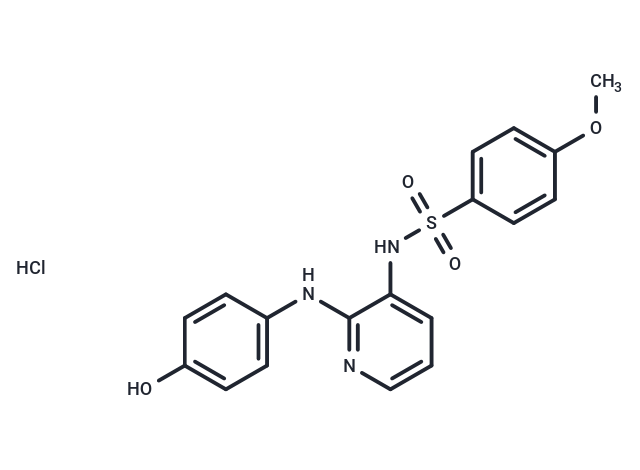Shopping Cart
- Remove All
 Your shopping cart is currently empty
Your shopping cart is currently empty

ABT-751 (E7010) hydrochloride is a novel sulfonyl anti-mitotic compound and a tubulin binder with high oral bioavailability. This agent binds to the colchicine site on β-tubulin, inhibiting the polymerization of tubulin which results in cell cycle arrest at the G2/M phase and induces apoptosis, effectively preventing cell division. Additionally, ABT-751 (E7010) hydrochloride induces autophagy by inhibiting the AKT/MTOR signaling pathway. It exhibits significant inhibitory effects against various types of cancer cells, including lung, stomach, colon, and breast cancer.

| Pack Size | Price | Availability | Quantity |
|---|---|---|---|
| 10 mg | Inquiry | 10-14 weeks | |
| 50 mg | Inquiry | 10-14 weeks |
| Description | ABT-751 (E7010) hydrochloride is a novel sulfonyl anti-mitotic compound and a tubulin binder with high oral bioavailability. This agent binds to the colchicine site on β-tubulin, inhibiting the polymerization of tubulin which results in cell cycle arrest at the G2/M phase and induces apoptosis, effectively preventing cell division. Additionally, ABT-751 (E7010) hydrochloride induces autophagy by inhibiting the AKT/MTOR signaling pathway. It exhibits significant inhibitory effects against various types of cancer cells, including lung, stomach, colon, and breast cancer. |
| In vitro | ABT-751 hydrochloride (2 μM; 4, 8, 24h) demonstrates multiple effects on Hep-3B cells, a hepatocellular carcinoma-derived line, including disruption of mitosis, mitochondrial membrane potential, induction of ROS production, and DNA damage. Additionally, in these cells, ABT-751 hydrochloride interferes with DNA integrity, inhibits cell proliferation, and induces G2/M cell cycle arrest. Furthermore, this compound promotes autophagy in Hep-3B cells lacking TP53 through inhibition of the AKT/MTOR signaling pathway, and induces apoptosis via caspase-dependent, extrinsic, and intrinsic pathways. The expression of exogenous TP53 gene further enhances the autophagy and apoptosis induced by ABT-751 hydrochloride in these cells. |
| In vivo | ABT-751 hydrochloride administered at a dosage of 100 mg/kg/day orally with a schedule of 5 days on followed by 5 days off, repeated twice over a period of 21 days, has demonstrated significant inhibitory effects in a neuroblastoma model, and has significantly reduced or eliminated tumor volumes in rhabdomyosarcoma and renal cell carcinoma models. Furthermore, ABT-751 enhances the effects of Vincristine and Paclitaxel, showing a synergistic effect. In the models of prostate, non-small cell lung, and breast tumor xenografts in mice, ABT-751 hydrochloride (100 mg/kg/day, 5 days on, 5 days off x2) also exhibits a synergistic action with Docetaxel, improving the suppression of tumor growth. |
| Alias | E7010 hydrochloride |
| Molecular Weight | 407.87 |
| Formula | C18H18ClN3O4S |
| Cas No. | 141450-48-8 |
| Storage | Powder: -20°C for 3 years | In solvent: -80°C for 1 year | Shipping with blue ice. |

Copyright © 2015-2025 TargetMol Chemicals Inc. All Rights Reserved.